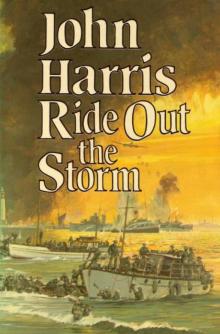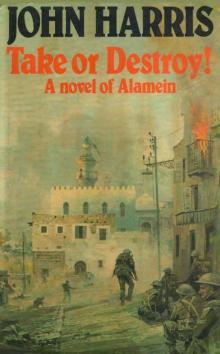- Home
- John Harris
Fox from His Lair Page 2
Fox from His Lair Read online
Page 2
Iremonger stared over the side at the sailors bent over the sprawled figures in the boat, at the German who was now being pushed along the deck, and then across the water to where ships’ boats, cutters, DUKWs and other small craft dotted the water among the bobbing heads where the landing craft had disappeared.
‘A war on?’ he said in an awed voice. ‘By God, there sure is!’
Two
London was grey under the racing scud of cloud. After four and a half years of war, the buildings had a weary look, dark, heavy and scarred with bomb splinters from the blitzes. The people had the same shabby look about them. Their clothes were drab and too well worn, so that the few Americans in the streets looked like wealthy relations in their well-fitting uniforms. Here and there, eagle-eyed American military policemen waited in twos in the entrances of buildings, their white helmets, spats, belts and pistol holsters bright against their dull clothes. Their British counterparts, in their uglier, less comfortable uniforms and clumsy red-topped caps, eyed them with a faint resentment for their better conditions and rations and the success they undoubtedly enjoyed with the girls.
Watching from his window four storeys up from the street, Major Cuthbert Pargeter was frowning. On the other side of the desk, another man stood with his eyes on him. ‘Murder’s always awkward,’ he was saying doggedly. ‘And when it’s connected with the invasion of Europe it’s doubly awkward.’
Pargeter turned. He was a slightly-built man, young, pale-faced and oddly intense. His eyes were pale too, like his hair, so that everything about him had a neat but curiously anonymous effect.
‘You don’t have to tell me, Superintendent,’ he said.
The superintendent’s burly shoulders lifted in a shrug and Pargeter took out a cigarette, offered one to the superintendent and sat down.
The policeman produced a light and sat down opposite him. ‘I think we’re in a hurry on this one, Major,’ he suggested.
Pargeter nodded. ‘I think we are,’ he agreed. ‘And they sent you to me because it was army, not civilian. Right?’
Mollified by Pargeter’s failing to rise to his own bad temper, the superintendent nodded. ‘Bit more than that,’ he said. ‘It’s murder and that’s what I deal with. I brought in that Canadian who killed that kid in Essex–’
‘So I’ve heard,’ Pargeter said. ‘Jolly good show.’
The superintendent was almost beginning by this time to like Pargeter, because praise came rarely from his own superiors. ‘But this is different,’ he said.
‘Why, Superintendent?’ It hadn’t escaped the policeman’s notice that Pargeter never failed to give him his title, something the army persistently failed to do.
‘The murdered man was a British officer.’
‘There’ve been other murdered British officers.’
‘This one had been hanging about the American camps in Devon, doing a lot of talking and asking questions. That area’s been sealed since April 2nd, as you know. And on the night of April 27th and 28th there was a rehearsal off Slapton Sands. The Germans got among the landing craft.’
‘I heard that.’
‘Down there now, security’s so tight nobody wants to know us. So I’ve been told to turn over everything I’ve got to your department. It’s in your lap, Major. The Americans are making it too hard for us. They’re keeping things so secret down there, they’re having to spy on each other to find out what’s happening.’
Pargeter’s thin nose gave an audible sniff. ‘What makes you think they won’t make it hard for me?’
‘At least you’ve got the War Office behind you.’
The superintendent shrugged and Pargeter sighed. ‘Better tell me what you know,’ he said. ‘Motive for a start.’
The superintendent gestured ‘Well, his wallet was found beside him – empty. But it wasn’t robbery because his watch was still on his wrist and it was a valuable one.’
‘Name?’
The superintendent pushed a file across. ‘It’s all in there. Everything we know. Name of Dunnaway. Captain Arthur Clarke Dunnaway. Pay Corps. He was supposed to be stationed up here in London. So what was he doing down in Portsmouth?’
‘Is that where he was found?’
‘On a bomb site near the docks. For a man who was stationed in London he seems to have spent a lot of time moving about. His unit says he was an accountant and his job was to check accounts. There’s been a lot of fiddling with funds – there always is, of course – but his work had nothing to do with the Americans and he seemed to spend a lot of his time in hotels and he always seemed to be in the company of American officers.’
‘Homosexual, do you think?’
‘That’s as far as I’d got when I was told to hand it over to you.’
‘Any suggestions as to where I should start?’
The superintendent shrugged. ‘Down there,’ he said. ‘We’ve checked here in London. It’s in the file. Before he was called up into the army, he had a job with a firm of accountants in Woking. Thirty-three years old. Degree from Cambridge as well as his accountancy letters.’
‘Sounds bright.’
‘I think he was bright. He must have been. Immediately he joined the army, he was posted to London. He didn’t do initial training like everybody else, but went straight to the War Office.’
‘Do they have anything on him?’
‘They say he was an accountant. Full stop. They say they know no more about him than we do. Because of his ability, he was given a sort of roving commission and had been on the move round the country ever since. He didn’t seem to do a lot of accounting.’
‘Oh?’
‘There was a team worked with him. A lieutenant, a sergeant and two men – all Pay Corps.’
‘Do they know anything about him?’
‘No.’ The policeman stubbed out his cigarette. ‘His men seemed to do the nose-to-the-grindstone stuff while he just wandered about talking to people.’
‘Sometimes that’s a good way for a detective – any sort of detective, even an accountancy detective – to work. As I’m sure you’ve found out more than once yourself.’ As the superintendent shrugged again, Pargeter leaned forward. ‘Home background?’
‘Nothing very unusual. Father was a top civil servant who’d retired but returned to work in 1939. He was killed with his wife in the blitz in 1940. Dealt with foreign affairs, it seems. The son did very well at school and his degree was in European languages.’
‘Was it now? Which?’
‘French, Spanish – and German.’
‘Married?’
‘No.’
‘Girlfriends?’
‘None we’ve found. Seems to have been a loner.’
‘Wonder what American officers had, that our people didn’t have.’
‘Money, I expect.’
‘Or information. Where was he last heard of?’
‘Plymouth, April 24th.’
‘I’ll start there. Who’s the American I should contact? There must be one.’
‘Chap call Iremonger. Colonel Linus C Iremonger.’
‘Who’s he?’
‘Security.’
‘I’ll go and see him.’
The superintendent grinned unexpectedly. ‘You’ll be lucky,’ he said.
Three
‘One hundred ninety-seven sailors; four hundred forty-one soldiers. That’s a lot of men, Colonel. That’s a lot of men to die in something that wasn’t the real thing!’
Colonel Iremonger looked round at the speaker, his mouth twisted sourly. The other officer had come down from London and, since he was a logistics specialist and unlikely ever to risk his own neck in battle, the comment had a bitter flavour for Iremonger.
‘They weren’t even trying to get ashore on French soil,’ the officer went on. ‘They were trying to get ashore here. On Slapton Sands! And nobody was shooting at them. Except, that is, those goddam E-Boats. And six hundred thirty-eight men is a lot of dead men, especially since most of ’em were engineers
who’re going to be badly missed when the real thing comes up.’
Colonel Iremonger scowled and turned away to stare at the dead man at his feet. He was an officer, lying in a pool of water left by the receding tide, face down in the sand, still wearing a lifejacket and still carrying the equipment that had not given him a chance when he had found himself swimming for his life.
Iremonger lifted his head and looked at the steep slopes of the Devon and Dorset hills, purple under the low cloud, then he turned to the sergeant who was kneeling by the corpse. ‘Got his name, Weinberger?’ he asked.
‘Yessir.’
‘Ticked him off?’
‘Yessir.’
‘How many’s that make?’
‘Six, sir.’
Iremonger frowned. He was a short burly man with a blue emery of beard on his square chin. He looked like a boxer and though, like all Americans, he wore a well-cut uniform, his somehow didn’t seem to fit him and looked as though his muscles were bulging out at every angle. His eyes were hot and dark and angry.
He lit a cigar and straightened up. Along the tide line in the easterly wind were other groups of men, mostly Americans but also a few British and Polish who’d been brought in to help, grouped about sprawled figures lying on the sand. There was a huddle of jeeps higher up the beach, an ambulance and several covered lorries. Another group of men was busy lifting a corpse wrapped in a blanket into the back of one of them.
‘Nearly seven hundred men,’ the logistics officer went on with the persistence of a terrier at a rat hole. ‘For God’s sake, that’s a pretty high rate even for a shooting war, let alone an exercise! Seven hundred, Colonel! Seven hundred!’
Iremonger took his cigar out of his mouth. ‘Listen, son,’ he said with ill-concealed impatience. ‘For Pete’s sake, stop saying that! You sound like a professional mourner. If we have no more than seven hundred dead when we go into Europe, I don’t think anybody’ll complain, except the guys who’re dead. Now shut up and go away. I’ve got things to do. Important things.’
The logistics officer’s eyes flashed; then he gestured at the dead man. ‘More important than this?’ he demanded.
‘Yeah!’ Iremonger’s jaw stuck out. ‘More important than this. Much more important than this.’
The logistics officer turned away, affronted, and went to find someone who was more prepared to listen to his indignation. Iremonger stared after him; then he realised the sergeant kneeling by the corpse was waiting for him. He turned and clicked his fingers. The sergeant handed him a waterproof packet he’d taken from the inside pocket of the dead man’s blouse and he pushed it into a canvas bag he held.
‘Four to go,’ he said half to himself. ‘Four to go.’
The wind was still cold, whipping along the broad stretch of sand, full of dampness and chill. Along the tide line, as Iremonger and his sergeant moved towards them, men were collecting lifebelts and equipment, which had been washed up by the sea.
‘How many have they found, Sergeant?’ Iremonger asked. ‘At the last count.’
‘Pretty well all of them now, sir,’ the sergeant said.
‘Except the four we want.’
‘Think the Germans got a tip-off, sir?’
Iremonger’s eyes narrowed. ‘They were certainly prowling around looking for something.’
‘What’s General Bradley think, sir?’
Iremonger chewed his cigar. ‘What do you think he goddam thinks?’ he snorted. ‘He was at sea like I was and didn’t even know what had happened till he was told. He knows what we’re up against. It was the general who insisted on a thorough count being made.’
‘Why, sir?’
‘Orders from the high altar. We’ve got to account for everyone who’s missing.’
‘A dead man’s a dead man, sir.’
‘I guess these are different.’
A jeep detached itself from the group of vehicles higher up the beach and headed towards Iremonger. The man beside the driver was Orme, the brigadier-general who had been aboard the destroyer with him.
Iremonger lifted his hand in salute and Orme nodded in reply as he climbed out.
‘’Morning, Linus,’ he said. ‘How are we doing?’
‘Four to go, sir,’ Iremonger said. ‘We’ve just picked up number six.’
‘I don’t have to tell you how important it is that we account for every one of them.’
‘No, sir, you don’t.’
‘You know why, of course?’
‘Some of it, sir. They’re Bigot officers.’
Orme took Iremonger’s arm and drew him aside beyond the hearing of the sergeant and the driver of the jeep. ‘Know what Bigot officers are?’ he asked.
‘No, sir. I have their names, ranks and numbers but I guess I don’t know what they are.’
‘I’ll tell you,’ Orme said. ‘With the invasion, the usual top secret classification was considered inadequate for the more critical details, and these were placed under a super-secret classification known as “Bigot”. Officers authorised to have access to such plans had special clearances which entitled them to be known as “bigoted”. Ten of them were lost on Exercise Tiger and every one of them knew the invasion plans.’
‘All of ’em, sir?’
‘All of ’em. Most people – me, for instance – know bits. A little here and a little there. We each know our own particular area and our own particular job. These guys knew the whole lot and they had their documents with them.’
‘The plastic packets, sir?’
‘Sure. The plastic packets. They were the guys who knew where everything fitted, how everything co-ordinated, times, places, numbers, how we’re going to get ashore, where we’re going to get ashore, how we’re going to whip the Germans, and which way we’re going to go when we break out of the beachhead.’
Iremonger whistled. ‘That sure is some responsibility they were carrying,’ he said.
‘Exactly. There were ten German E-boats and we only sank one, so, for all we know, one of the others might have picked up survivors, one of them one of our Bigot officers. He might have been dead but it wouldn’t matter either way because most of them had enough documents on them to blow the whole show. We therefore have to know whether they were picked up or not because, if they were, the whole goddam plan for the invasion’s on the line.’
Iremonger frowned. ‘Will it have to be changed sir? That sounds one hell of a job.’
‘Not impossible, Linus.’ Orme shrugged. ‘Difficult, but not impossible. The point is that if the Krauts did pick up one of these officers, then things must be changed. If they didn’t, we’d be wiser to leave them as they are. That’s why we have to account for every goddam one. Changes now could ruin the whole shebang, because we don’t really have time this year to set up anything different.’
Iremonger chewed on his cigar. ‘Well, we’re doing what we can, sir. I’ve been working with the Limey navy at Plymouth on currents and drift, getting their advice on where to look. They’re just beginning to appear in numbers. I guess we’ll find them all in the end.’
‘If the Germans didn’t find them first.’ Orme turned back towards the jeep. ‘Keep me informed, Linus.’
‘Sure will, sir.’
Orme began to climb into the jeep; then he stopped and turned. ‘Oh, one thing,’ he said. ‘There’s a British officer waiting to see you when you’ve finished for the day. He’s Security same as you, so you’ll maybe have something in common.’
Iremonger doubted it. He hadn’t so far discovered that he had anything in common with the British. Their goddam country was too small and the British were stuffy, slow and lacking in what he called get-up-and-go.
‘Guy called Pargeter,’ Orme said.
‘Is he going to work with me?’ Iremonger asked.
‘No, Linus. He’s following a line of enquiry of his own. It just happens to cross ours, that’s all.’
‘I’m busy, General,’ Iremonger objected. ‘Can’t he wait?’
�
�No, Linus, he can’t. I know you’re not very fond of the British but you might remember occasionally that they were fighting this war – in the front line – for two years before we came into it.’
‘If they’d been ready, they’d not have got in the mess they did.’
‘For God’s sake, Linus, we didn’t do so damn well ourselves at Pearl Harbour! And you might not have noticed all the housewives queuing up with their ration books for food. Have you seen American housewives queuing up for food? We’ve invaded their country. American privates earn three times as much as the British. An American staff sergeant’s pay equals a British captain’s. And a lot of that dough’s invested in chasing British girls – even British wives. It’s a tribute to their civility that they endure us with good will. So see this guy, Linus, and give him what he wants.’
Since bodies had been found along the whole coast from Start Point as far east as Lyme Regis, Iremonger had established a temporary headquarters at Dawlish on the coast south of Exeter, which was about halfway between the two extremities of his search. It was a room in a set of offices belonging to the town council and his equipment consisted of little more than a table and a telephone, with two or three men to man them. The officer cradling an ash plant and waiting on a stiff-backed chair as he returned looked English enough with his pale hair and eyes to make Iremonger feel ill, and he knew at once that he was certainly not his type. Iremonger’s types were all burly men, strong-drinking men handy with their fists, headlong men who knew where they were going. The Englishman was slight, quiet and colourless, and Iremonger decided sourly that he probably hadn’t even started to shave.
The Englishman rose and offered his hand. To Iremonger it felt like a warm dead fish, and maliciously he grasped it and squeezed hard. To his surprise, the Englishman squeezed back with equal vigour and the two of them stared at each other, their hands locked, each trying to sum the other up.
‘Pargeter,’ the Englishman said quietly. ‘Cuthbert Pargeter.’
Oh, Jesus, Iremonger thought. Cuthbert!
‘Iremonger,’ he growled. ‘Linus Iremonger. Linus C Iremonger.’

 China Seas
China Seas The Mercenaries
The Mercenaries Road To The Coast
Road To The Coast The Thirty Days War
The Thirty Days War The Old Trade of Killing
The Old Trade of Killing Ride Out The Storm
Ride Out The Storm Corporal Cotton's Little War
Corporal Cotton's Little War Fox from His Lair
Fox from His Lair Paint The Rainbow
Paint The Rainbow Flawed Banner
Flawed Banner Covenant with Death
Covenant with Death So Far From God
So Far From God The Sea Shall Not Have Them
The Sea Shall Not Have Them The Cross of Lazzaro
The Cross of Lazzaro Smiling Willie and the Tiger
Smiling Willie and the Tiger Harkaway's Sixth Column
Harkaway's Sixth Column The Sleeping Mountain
The Sleeping Mountain The Claws of Mercy
The Claws of Mercy North Strike
North Strike Picture of Defeat
Picture of Defeat Army of Shadows
Army of Shadows Right of Reply
Right of Reply Getaway
Getaway The Lonely Voyage
The Lonely Voyage Take or Destroy!
Take or Destroy! The Backpacker
The Backpacker A Funny Place to Hold a War
A Funny Place to Hold a War Swordpoint (2011)
Swordpoint (2011) A Kind of Courage
A Kind of Courage